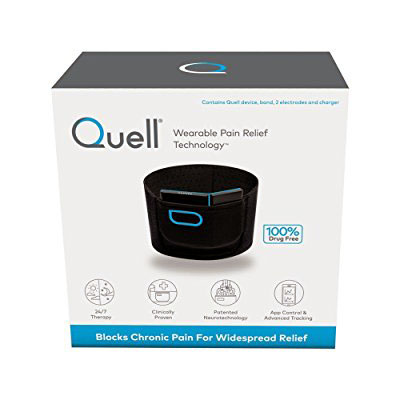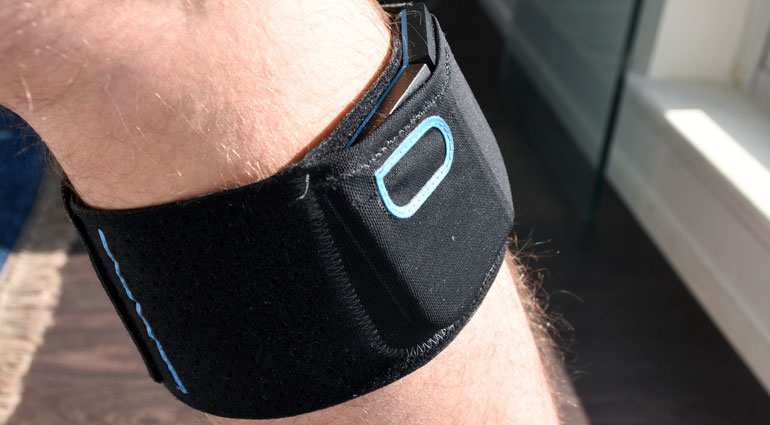GSK Consumer Tries On Wearable Pain Relief With NeuroMetrix Deal
Executive Summary
GSK Consumer purchases ex-US rights to pain relief device Quell from NeuroMetrix in a deal that includes co-development of transcutaneous electrical nerve stimulation products.
GlaxoSmithKline PLC is preparing for a big splash in the OTC device space by acquiring ex-US rights to NeuroMetrix Inc.'s Quell wearable pain-relief technology and working with the firm on additional transcutaneous electrical nerve stimulation (TENS) products.
GSK Consumer Healthcare LP, Glaxo's OTC and dietary supplement joint venture with Novartis AG, will pay $5m for Quell international rights and up to $21.5m at development and commercialization milestones. The agreement announced Jan. 17 also includes co-funding development of TENS technology, which impacts nerves on targeted delivery of electrical stimulation, through 2020, with annual renewals determined by mutual agreement.

NeuroMetrix retain exclusive US ownership of Quell technology while GSK Consumer Health gains international rights in the firms' deal.
It will collaborate with NeuroMetrix to develop wearable TENS technology that “complements existing medicines and treatments so that consumers have a number of different approaches to manage their health,” a Glaxo spokeswoman said Jan. 19.
“GSK Consumer Healthcare continually seeks opportunities to innovate, especially in those categories where we offer a strong portfolio of brands, like pain relief,” she noted.
It already markets OTC pain relief products in the US and international markets including Excedrin Migraine medicine (aspirin 250mg, paracetamol 250mg and caffeine 65mg), Panadol (500mg paracetamol), Fenbid (ibuprofen) and Voltaren (diclofenac) topical non-steroidal anti-inflammatory drug.
Revenues for Quell, which launched in 2015, were $3.6m in the fourth quarter and $12.4m for 2017, NeuroMetrix said in a Jan. 25 earnings release.
NeuroMetrix will retain exclusive US ownership of Quell technology. It is an FDA-cleared device worn on the upper calf that “taps into the body’s natural pain response system to provide widespread pain relief,” the Waltham, Mass.-based company says.
Quell combines neurotechnology in a wearable format with a smartphone app that allows users to personalize and control therapy while tracking their pain and relevant health metrics, such as communicating to the app details about the user’s sleep characteristics and activity levels, the company says.
Quell users, who wear the product on average six times a day, can synchronize their data with the Quell Health Cloud, which provides a chronic pain database researchers access for better understanding chronic pain at the population level, NeuroMetrix says.
“We will continue to focus on building Quell into a leading US consumer healthcare brand while collaborating with GSK on Quell product development and supporting their international commercialization efforts,” NeuroMetrix said in a Jan. 17 release announcing the deal.
Devices Gain From Pain Med Problems
Wearable pain relief devices are a booming market, especially the most common OTC form – TENS devices. While TENS devices have been among the top sellers, NeuroMetrix introduced interactive and tracking capabilities to the category with Quell.

GSK Consumer Health and NeuroMetrix will co-fund development of wearable TENS technology used in the Quell device.
Industry consultants in recent years have pushed companies to incorporate smartphone apps to assist in using OTC drugs or devices as consumers look to reduce doctors’ visits and take more control over their health care. (Also see "Smartphone Apps Appropriate For OTC Product Instructions – Consultant" - Pink Sheet, 15 May, 2017.)
On a global basis, the market for OTC and Rx pain management devices was $3.08bn in 2016 and is expected to grow at a compounded annual growth rate of 8.5% through 2021, with North American accounting for the largest of sales, according to 2016 report by India market researcher MarketsandMarkets Research Private Ltd.
“A number of factors, such as the growing demand for long-term pain management among the geriatric population, large patient population base, adverse effects of pain medications” and the development of novel pain management devices are driving that increase, MarketsandMarkets noted in a release summarizing study results.
The demand for OTC pain management devices also is in line with growing consumer demand for non-drug options for ailments, NeuroMetrix's positioning for Quell. In a clinical study it published in the Journal of Pain Research in 2016, the firm said 67% of 88 subjects reported a reduction in pain medication use after 60 days of using the device; 81% reported a general improvement in chronic pain.
[Editor’s note: Thank you for reading this article. Please help us to better help you by taking our Pharma Feedback survey. Not only will your participation help steer our efforts to continually improve the content and delivery of our products – you’ll also have a chance to win one of four Amazon gift cards valued at $100.]
